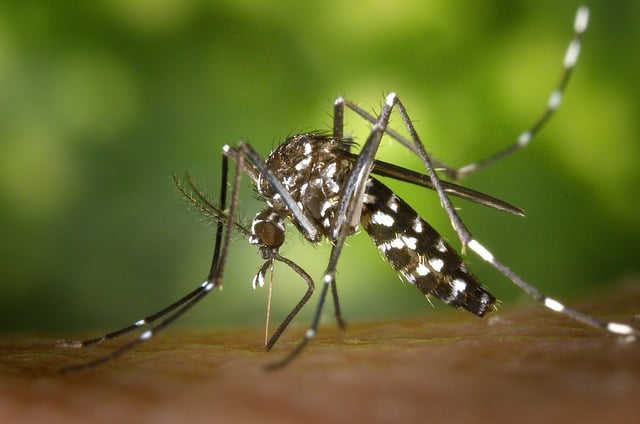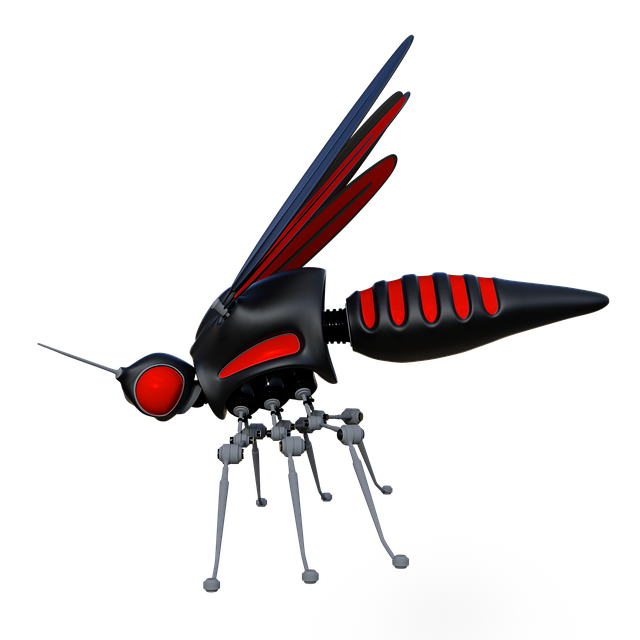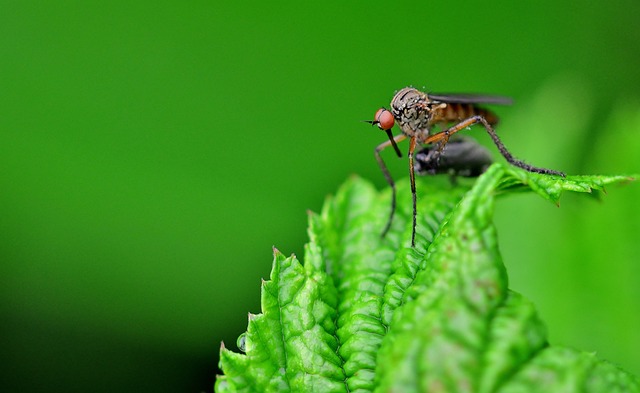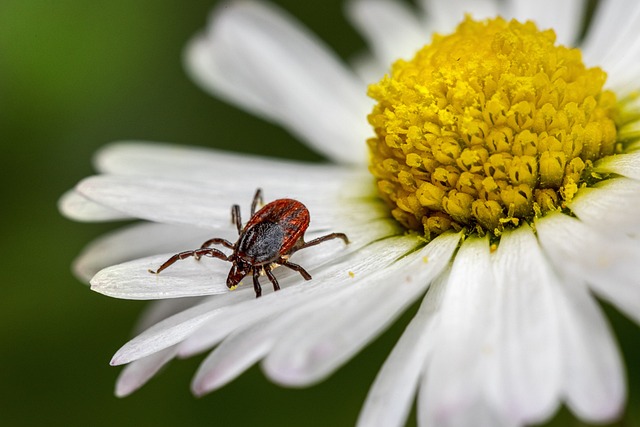Mosquitoes and ticks pose significant health risks by transmitting diseases like Zika, West Nile, Lyme, and Anaplasmosis. Effective control requires understanding their behaviors and habitats. Mosquitoes breed in standing water, while ticks thrive in lush vegetation. Professional services employ targeted treatments including repellents, traps, and integrated pest management (IPM) to disrupt their life cycles. Regular yard maintenance, such as removing standing water and trimming foliage, complements these efforts for sustainable control with minimal environmental impact. Seasonal variations necessitate proactive measures and adjustments in treatment plans. Selecting reputable professionals specializing in mosquito and tick control ensures effective, safe, and environmentally friendly protection of outdoor spaces.
In the quest for a peaceful, pest-free outdoor sanctuary, understanding and addressing yard pest issues is paramount. Mosquitoes and ticks, in particular, pose significant health risks, from transmitting diseases like Zika and Lyme to causing discomfort with their bites. This article explores effective strategies for mosquito and tick control, delving into traditional methods, modern techniques, eco-friendly solutions, seasonal considerations, and the importance of selecting the right professional pest control services for comprehensive protection.
Understanding Yard Pest Issues: Mosquitoes and Ticks

Mosquitoes and ticks are among the most common yard pests, posing significant health risks to both humans and pets. These insects can transmit various diseases, including Zika virus, West Nile virus, Lyme disease, and Anaplasmosis, making mosquito and tick control crucial for any comprehensive pest prevention service.
Understanding their behavior and habitats is essential in effective control. Mosquitoes breed in standing water, so eliminating these sites around your property is key to preventing infestations. Ticks, on the other hand, thrive in lush, dense vegetation, under debris, and in areas with high grass or woodpiles—regular yard maintenance and landscaping can significantly reduce their presence. Professional services employ targeted treatments, such as applying repellents, using traps, and implementing integrated pest management strategies to disrupt these pests’ life cycles and protect your outdoor spaces.
The Impact of Pests on Health and Property

Pest infestations, especially from mosquitoes and ticks, can have a significant impact on both health and property. Mosquitoes are known carriers of various diseases such as Zika, West Nile, and Dengue fever, posing serious risks to human health. They can also cause discomfort and sleep disturbances due to their persistent biting. Ticks, on the other hand, transmit diseases like Lyme disease and Rocky Mountain spotted fever, which require prompt medical attention. These pests not only affect humans but also pets, livestock, and garden plants.
Moreover, pest infestations can lead to property damage. Mosquitoes and ticks often breed in stagnant water sources around homes, such as buckets or clogged gutters, and their presence can attract other pests like roaches and rats. Ticks can attach themselves to pets and clothing, causing irritation and potentially leading to serious health complications. Regular yard maintenance and pest prevention services are crucial to eliminating these hazards, ensuring a healthier living environment, and safeguarding valuable properties from potential losses.
Traditional Mosquito and Tick Control Methods

Traditional methods of mosquito and tick control often rely on chemical pesticides, which can be effective but come with potential drawbacks. These synthetic substances may pose risks to non-target organisms, including beneficial insects and wildlife, and can have adverse effects on the environment if not applied correctly. Sprays and fogs, commonly used for quick relief, offer temporary solutions as they don’t address the root causes of pest infestations.
An alternative approach involves using biological agents like bacteria (Bacillus thuringiensis) and parasites to target specific pests. These organic methods are more eco-friendly but may require consistent application. Landscapers and professionals often recommend combining these strategies with proper yard maintenance, such as removing standing water (a breeding ground for mosquitoes) and trimming foliage to improve air circulation, which can significantly reduce pest populations naturally.
Modern Yard Pest Prevention Techniques

In today’s world, modern yard pest prevention techniques have evolved significantly, offering eco-friendly and effective solutions for homeowners. One of the most sought-after services is mosquito and tick control, as these pests not only cause discomfort but also pose potential health risks. Advanced methods include targeted applications of natural repellents and biological controls, such as beneficial insects that feed on pest populations. These techniques are designed to minimize environmental impact while providing long-lasting protection.
Additionally, integrated pest management (IPM) strategies are gaining popularity. IPM involves a combination of tactics like proper landscaping, regular cleanup, and strategic use of pesticides only when necessary. By focusing on prevention and non-chemical methods, these modern approaches ensure a safer, healthier yard for families and pets while keeping mosquito and tick populations at bay.
Environmental-Friendly Solutions for Pest Management

In today’s eco-conscious world, many homeowners are seeking sustainable solutions for pest management in their yards. Environmental-friendly methods offer a safe and effective approach to keeping mosquito and tick populations at bay without harming the local ecosystem. One popular tactic is the strategic use of natural repellents, such as essential oils derived from plants like citronella and lavender, which can deter these pests naturally.
Additionally, implementing physical barriers and habitat modification techniques plays a crucial role. For instance, installing mosquito traps or using mesh netting over outdoor seating areas can significantly reduce pest exposure. Landscaping practices, such as removing standing water (a breeding ground for mosquitoes) and trimming vegetation to minimize hiding spots, are also effective in preventing tick and mosquito infestations. These eco-conscious solutions not only protect your yard but contribute to a healthier, more sustainable environment.
Seasonal Considerations for Effective Pest Control

In the realm of yard pest prevention, seasonal considerations play a pivotal role in effective control strategies. As we transition from one season to another, so do the behaviors and habitats of various pests, particularly mosquitoes and ticks. Spring and summer months, for instance, see an influx of these insects due to warmer temperatures and increased moisture levels, which are prime breeding conditions. Professional pest control services therefore tailor their approaches during these periods, focusing on proactive measures like eliminating standing water sources (a key breeding ground for mosquitoes) and applying targeted treatments to reduce tick populations.
Fall and winter present different challenges, with pests seeking shelter from the cold. Seasonal adjustments in treatment plans become crucial to prevent pest resurgence. For example, proper yard maintenance, including trimming vegetation and clearing debris, can help deter both mosquitoes and ticks from establishing comfortable habitats. Additionally, indoor pest prevention strategies are essential during these seasons, as some pests may attempt to enter homes seeking warmth. By understanding these seasonal dynamics, homeowners and professional services alike can implement effective mosquito and tick control measures throughout the year.
Choosing the Right Professional Pest Control Services

When it comes to safeguarding your yard from pesky mosquitoes and ticks, selecting the ideal professional pest control services is a crucial step. Look for companies that specialize in mosquito and tick control, as these experts will possess the knowledge and tools to effectively manage and eliminate these common pests. Reputable firms should offer tailored solutions, considering factors like the size of your property, surrounding vegetation, and specific pest issues you’re facing.
Reputation and experience matter; choose a company with positive customer reviews and a proven track record. Inquire about their methods, ensuring they employ safe, environmentally friendly practices, especially when children and pets are in the equation. With regular treatments and proactive measures, these professionals can transform your yard into a pest-free haven, allowing you to enjoy outdoor spaces without the hassle of mosquito and tick bites.
